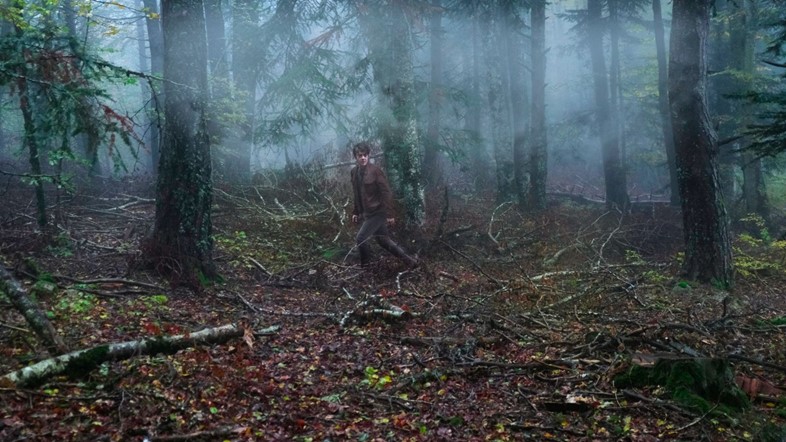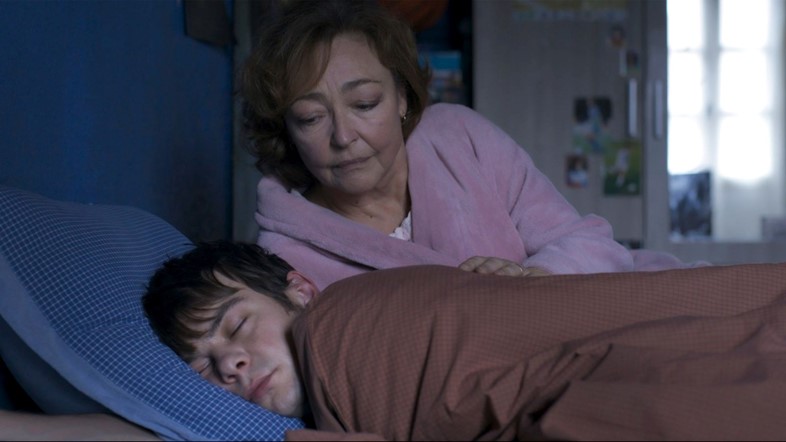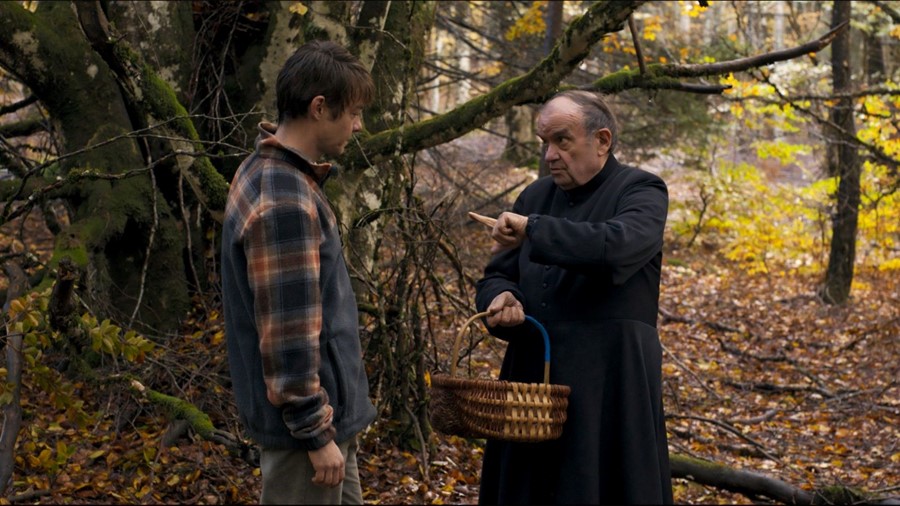As his provocative new film about a priest and murderer is released, Alain Guiraudie talks about death, nature, and the great mystery of desire
We’re in a blandly upmarket hotel in central London, the kind where Queen’s Don’t Stop Me Now pipes softly from the function-room PA for no particular reason, and Alain Guiraudie is explaining to me the importance of seeing a priest’s erection in his new film, Misericordia. “It’s funny but it’s also kind of touching because it’s the manifestation of his desire,” he says, twisting a sachet of sugar round his finger and discarding it on to the table.
The scene in question sees a conniving clergyman (Jacques Develay) dive into bed with a man suspected of murder when the police come knocking at his door. As the officer barges in, he springs out from under the bedsheets, stiffy waggling in the breeze. “Of course, he’s trying to get the policeman to leave. But I also wanted to have fun with the character, despite the fact that Catholicism prohibits marriage, prohibits a sexual life [for the priests]. I felt we had to show the very concrete reality of [this person’s] desire … The clergy have the right to erections, too.”
At the age of 60, Guiraudie has a flair for provocation that puts the would-be enfants terribles to shame. His latest, Misericordia, returns him to the noir territory of his deeply kinky breakout, Stranger by the Lake (2013), and concerns a rootless young man, Jérémie (Félix Kysyl), who revisits his childhood home for his old boss’s funeral. His stay with widow Martine (Catherine Frot) revives a decades-old beef with her hot-tempered son, Vincent (Jean-Baptiste Durand), before a violent showdown sets the scene for a twisted parable of crime and (non)-punishment in which an unexpected pact between priest and murderer emerges.
Inspired by the director’s own youthful feelings of attraction towards a friend’s father growing up in rural Occitania, the film is Guiraudie through and through: superficially quiet but simmering with lustful intent and full of fabulous imagery juxtaposing man with fecund nature. (The local pastime of mushroom-picking provides the film with its funniest moment, a subversive dinner-table scene that makes Phantom Thread seem tame by comparison.)
Guiraudie’s affinity for the wide-open spaces of la France profonde dates back to his earliest days as a filmmaker, when so much arthouse cinema was myopically fixated on the lives of the Parisian bourgeoisie. “It was a political thing for me,” he explains, “because most films [at the time] took place in the same few Paris arrondissements, the same apartments with the same interiors. I wanted to show nature, landscapes, open horizons. So that was a very clear intention on my part.”

Into that landscape slots the inscrutable Jérémie, whose true motives in returning to his hometown are unknown, perhaps even to himself. “I like to work with characters that are quite dubious, odd or potentially unsavoury,” says Guiraudie, “and we worked a lot with Félix on trying to get that balance with Jérémie … I like films where the characters arrive without a story – the actors are always asking me for more background and I just keep telling them no.” Mystery, says the director, is one of the “grand moteurs du cinema”, and one of the greatest mysteries of all is desire, a career-long theme in his anarchic, queer-centric body of work.
Which brings us neatly to our priest, who has reasons of his own for wanting to keep Jérémie close. If the latter is the sort of troubling blank Patricia Highsmith might have imagined, then the priest is even wilder: at once manipulative and moving in his desire for Jérémie, he’s a character Luis Buñuel would have killed to write. He gets all the film’s best lines, from his startling assertion of unrequited love in the confessional booth – “I could love you without noise for all eternity” – to his reassuring of a guilt-racked Jeremie that “we need unexpected deaths. We need accidents. We need murders.” It’s a fantastic line to put in the mouth of a priest, one that reflects director Claire Denis’ illuminating take on Guiraudie: he “succeeds in making us feel emotions we might be scared to feel”.
It is also, says Guiraudie, a line he very nearly left out of the film altogether: “I wrote it during the shoot and felt very unsure about it; when we were editing I said to myself, ‘Do I really think that?’ In the end what convinced me to keep it was to question this idea that we can completely protect ourselves, can seal ourselves off from all the risks that are out there. It’s completely inconceivable to lock up all the murderers before they’ve committed a crime. Death is just a part of life; that’s what makes it precious. And to live our lives, we have to accept the risks that come with it.”

The character is a window of sorts into Guiraudie’s roots in France’s bucolic southwest, where priests played an important role in village life. Though he long since abandoned the Catholic faith in favour of atheism, he retains a certain attachment to its tenets, explaining how he saw in the character an opportunity to take the concept of forgiveness to its logical extremes. That he most certainly does, though the question remains: how much of the priest’s professed laissez-faire attitude to murder stems from his own fleshy feelings for Jérémie? “I think he’s like most people, [who] find this balance between their principles as human beings and their own desires,” says Guiraudie, tickled by the question. “And in that sense, I suppose, I feel very close to the character. We just question it more closely because he’s a priest.”
Misericordia is out in UK cinemas now.
